In global business, the journey to success is often marked by resilience, strategic foresight, and a relentless pursuit of excellence. Top executives not only navigate complex challenges but also inspire and lead their organizations towards sustainable growth and innovation. Their experiences offer invaluable lessons for aspiring leaders and established professionals alike.
Embrace Innovation and Adaptation
One of the defining characteristics of successful business executives is their ability to embrace innovation and adapt swiftly to changing market dynamics. Leaders like Elon Musk, CEO of Tesla and SpaceX, epitomize this ethos. Musk has revolutionized the automotive and aerospace industries through his visionary approach to technology and sustainability. His relentless pursuit of cutting-edge innovation, from electric vehicles to space exploration, underscores the importance of daring to challenge conventions and pushing boundaries.
Similarly, Jeff Bezos, founder of Amazon, transformed the retail landscape by pioneering e-commerce and cloud computing with Amazon Web Services (AWS). Bezos’s emphasis on customer-centricity and long-term thinking propelled Amazon to become one of the world’s most valuable companies. His mantra of “Day 1” mentality—where every day is treated with the same urgency and focus as the first—reminds leaders to prioritize innovation and customer satisfaction continuously.
Foster a Culture of Excellence and Accountability
Leading executives understand that organizational success hinges on fostering a culture of excellence and accountability. Indra Nooyi, former CEO of PepsiCo, exemplified this by championing a corporate culture centered on performance with purpose. Under her leadership, PepsiCo embraced sustainability, diversity, and innovation while delivering strong financial results. Nooyi’s focus on nurturing talent and promoting a diverse workforce highlights the critical role of inclusive leadership in driving organizational success.
Satya Nadella, CEO of Microsoft, revitalized the tech giant by emphasizing a growth mindset and fostering a culture of empathy and collaboration. His transformational leadership style emphasizes continuous learning and innovation, empowering Microsoft to navigate the shift toward cloud computing and artificial intelligence successfully.
Lead with Vision and Strategic Clarity
Effective leaders possess a clear vision and strategic clarity that guide their organizations through uncertainty and change. Tim Cook, CEO of Apple, succeeded Steve Jobs with a focus on operational excellence and sustainability. Cook’s commitment to innovation, privacy, and environmental stewardship has reinforced Apple’s reputation as a global leader in technology and consumer electronics.
Mary Barra, CEO of General Motors, navigated the automotive industry’s transformation by prioritizing electric and autonomous vehicles. Her strategic focus on technology and sustainability underscores the importance of anticipating industry shifts and investing in future-oriented initiatives.
Cultivate Resilience and Navigate Adversity
The journey to success is often marked by challenges and setbacks, requiring resilience and adaptability from business leaders. Reed Hastings, co-founder and CEO of Netflix transformed the entertainment industry by pioneering streaming media services. Hastings navigated through numerous challenges, including competition and content disputes, by maintaining a focus on innovation and customer satisfaction.
Sheryl Sandberg, COO of Facebook (now Meta), demonstrated resilience in navigating the company through various regulatory challenges and privacy concerns. Her advocacy for digital transformation and social responsibility underscores the importance of ethical leadership in mitigating risks and sustaining long-term growth.
Drive Sustainable Growth and Social Impact
Top executives recognize the importance of driving sustainable growth while making a positive social impact. Brian Chesky, CEO of Airbnb, disrupted the hospitality industry by creating a global platform for short-term rentals. Chesky’s focus on community, sustainability, and cultural exchange has redefined travel experiences while promoting responsible tourism practices.
Marc Benioff, CEO of Salesforce, pioneered the concept of cloud-based customer relationship management (CRM) software while advocating for corporate social responsibility. Benioff’s commitment to philanthropy, equality, and environmental sustainability underscores the role of purpose-driven leadership in driving both financial performance and social impact.
Conclusion
The success stories of top business executives offer valuable lessons for aspiring leaders and professionals navigating today’s competitive business landscape. Embracing innovation, fostering a culture of excellence, and leading with vision and strategic clarity are essential attributes of effective leadership. Moreover, cultivating resilience, driving sustainable growth, and promoting social impact is critical for navigating challenges and building enduring organizations.
As we look to the future, the lessons from top executives highlight the importance of continuous learning, adaptability, and ethical leadership in driving success. By embracing these principles and embodying a commitment to innovation, collaboration, and social responsibility, future leaders can navigate complexities, inspire teams, and achieve sustainable growth in an ever-changing world of business.


















